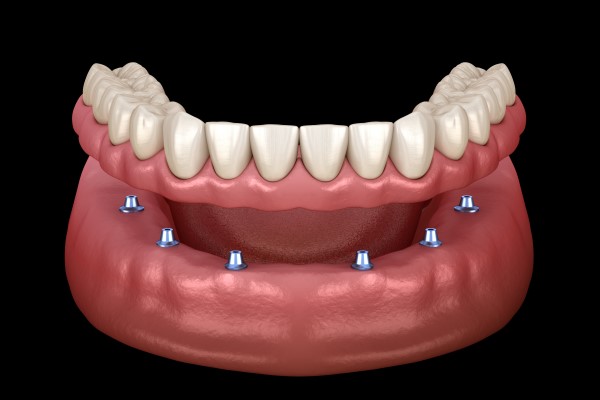Comparing Implant Supported Dentures to Conventional

Considering implant supported dentures? This treatment is one that has grown in popularity as it offers a hybrid approach to replacing entire arches of missing teeth. Combining dental implant placement with conventional dentures, patients are able to successfully replace teeth that have been lost to decay. One question that often arises when considering tooth replacement is how implant supported dentures differ from conventional ones. Keep reading to find out!
Implant supported dentures vs. conventional
Below is a quick overview of implant supported dentures and how they compare to conventional ones. This information can be helpful to review when considering different tooth replacement options.
Conventional dentures
Many people are familiar with traditional denture appliances. They have a reputation of being bulky, big and awkward in the mouth; however, that is not always the case. Modern-day dentistry has allowed for the evolution of better denture appliances, which helps make the tooth replacement process much easier. Nonetheless, with conventional dentures, wearers will have to undergo an adjustment period in which they get used to wearing false teeth.
Implant supported dentures
Dentures that are supported by implants are secured in place, rather than resting solely on the gums. First, dental implants are placed beneath the gums directly into the jawbone. After a few months of healing, the patient can return to the dentist in order to be fit for the denture piece. To complete the process, the denture piece will be attached to the head of the dental implants. The benefit of implant supported dentures is that they are held securely in place, which ensures easier eating, speaking and smiling.
The differences and similarities
Both conventional and implant supported dentures offer the same goal, which is to replace an entire arch of teeth that are missing. However, the difference is that conventional dentures are loose in the oral cavity, while implant supported ones are held securely in place by dental implants.
Most wearers of implant supported dentures find that they are able to function more normally as opposed to wearing traditional dentures. The adjustment period does not take as long with implant supported dentures; however, the entire tooth replacement process does take longer due to the need for osseointegration of the implants.
Oral hygiene is similar for both options; however, conventional dentures are to be soaked overnight in a solution. Since implant supported dentures are secured in place, wearers are to use a gentle toothbrush and denture cleaning solution.
Deciding which is best
Each patient has varying needs, which means deciding which option to choose can be difficult. The dentist will help point out pros and cons, as well as expectations, all of which is necessary to be familiar with beforehand.
When trying to decide between conventional and implant supported dentures, it is best to consult directly with a dentist. An evaluation can be done in order to determine which option may be most suitable. Additionally, questions and concerns can be addressed, which can be helpful when navigating through the decision-making process. Reach out today to learn more about tooth replacement or to get scheduled for an appointment.
Request an appointment here: https://frankforddentalcare.com or call Frankford Dental Care at (215) 302-1746 for an appointment in our Philadelphia office.
Check out what others are saying about our dental services on Yelp: Implant Supported Dentures in Philadelphia, PA.
Recent Posts
One option for someone who is missing teeth is implant supported dentures. It is important to fill in gaps in the mouth; not doing so has a variety of unwanted consequences. In the short term, a missing tooth often leads to pain, as the nearby teeth will start to shift. In addition, these teeth are…
If you are missing teeth, you may assume that your only options are receiving implants or dentures from your dentist. A recent option to replace missing teeth is a combination of the two strategies: implant-supported dentures.There are some situations in which traditional dentures are better and others in which the implant-supported variety would provide greater…
The implant-supported dentures process can take anywhere from six months to a year to complete. The time it takes to get implant-supported dentures depends on a variety of factors and is unique for every patient. During the first visit with a dentist (the consultation), they can provide a tentative timeline for how long the process…
You may have heard of the classic traditional dentures, but you may not realize that there are other, more stable options out there, like implant supported dentures. While conventional dentures rely on the gums and mouth muscles for support, implant supported dentures (as their name suggests) are attached to and supported by implants in the…


